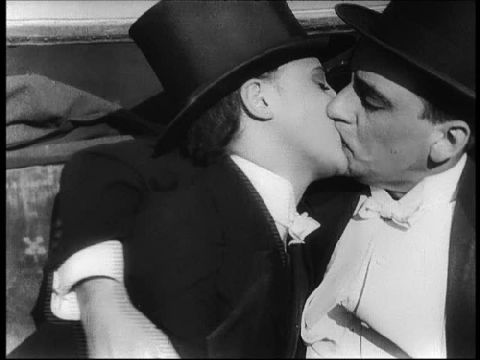I Don’t Want to Be a Man (1918) 

Director: Ernst Lubitsch
Cast: Ossi Oswalda, Curt Goetz, Ferry Sikla
Synopsis: A teenaged tomboy, tired of being bossed around by her strict guardian, impersonates a man so she can have more fun, but discovers that being the opposite sex isn’t as easy as she had hoped.
This early Ernst Lubitsch movie provides few touches of the cultured output he would produce in Hollywood in the 1930s and ‘40s. In fact there’s not a lot to distinguish it from other comedies of the era, other than an over-the-top performance from 21-year-old leading lady Ossi Oswalda, whose bizarre acting style seems to channel the energy of a hyperactive but ever-so-slightly touched in the head child. Lubitsch made a few movies with Oswalda before moving on to the more conventional — but no less fascinating — Pola Negri.
I’m not sure if Oswalda is supposed to be playing herself or the fact that her character shares the same name is just an attempt at cuteness on the part of Lubitsch and co-writer Hanns Kraly, but either way her character is Ossi Oswalda, a wilful young woman with a fondness for booze and fags and playing cards with the boys. Today, such activities wouldn’t rate a second glance, but back in 1918 Germany her kind of behaviour was frowned upon so her wealthy uncle and governess hire a young man named Dr. Kersten (Kurt Gotz) to supervise her.
Angered that her sex precludes her from being one of the boys, Ossi hits on the idea of dressing up as a man in order to sample the hedonistic pleasures they enjoy. She visits a tailors shop, where the half dozen or so sales assistants excitedly squabble with one another over who will get to measure her for a gentleman’s evening suit. Later, in the privacy of her room, Ossi dons the menswear she has purchased and hides her long hair beneath a wig. To be honest, she looks like a small boy dressed up tin his Sunday best, but this doesn’t discourage Ossi who saunters confidently into the street.
There follows a series of sketches intended to illustrate just how mistaken Ossi is about the easy life enjoyed by men. On the bus, she is harangued into giving up her seat for a woman. At the club she attends, she must jostle for position in order to receive service at the cloakroom. On the dance floor she spies Kersten breaking up with a young lady and, intrigued to see whether he will recognise her, Ossi introduces ‘himself.’
From this point things get a little strange, with the story straying into homo-erotic territory as Kersten and his new friend become increasingly inebriated. Feeling ill after smoking a cigar, Ossi stumbles to the toilets and, forgetting that she’s dressed as a man, nearly enters the ladies. Realising her mistake in the nick of time, she then staggers towards the gents before hesitating in front of the door for a while and then returning to the box she is sharing with Kersten. It’s as if Lubitsch and Kraly were aware of the comic potential of the situation, but were afraid — or constrained by the censorship of the day — to let Ossi enter either toilet.
Totally legless, the two new friends stagger into the street (jarringly bathed in bright sunshine) and hail down a horse and carriage. As they slump semi-conscious in the buggy, Kersten and Ossi engage in some highly questionable canoodling bearing in mind that Kersten, at this stage, is still under the impression that Ossi is a man. Clearly, the Germans in 1918 were a lot less coy about homosexuality than they were about unisex sanitary arrangements.
The whole thing is a bit flat, to be honest. Much of this is perhaps down to the age of the film. Most of the basic techniques of moviemaking were already in place by then, but, with perhaps a few exceptions, filmmakers hadn’t yet developed the level of narrative sophistication required to develop a storyline that would stand up to today’s standards. But then, even by 1918 standards, there isn’t a great deal to recommend I Don’t Want to Be a Man other than the curiosity value of seeing some of Lubitsch’s early work.
(Reviewed 4th April 2013)
httpv://www.youtube.com/watch?v=iCaZbFuPPYM
